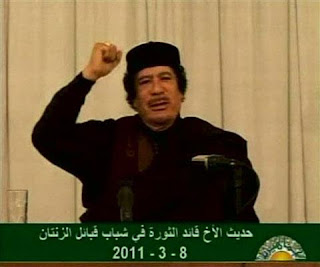President Barack Obama will lay out a new U.S. strategy toward a skeptical Arab world on Thursday, offering fresh aid to promote democratic change as he seeks to shape the outcome of popular uprisings threatening both friends and foes.
In his much-anticipated "Arab spring" speech, Obama will try to reset relations with the Middle East, but his outreach could falter amid Arab frustration over an uneven U.S. response to the region's revolts and his failure to advance Israeli-Palestinian peacemaking.
Obama is expected to unveil new economic aid packages to bolster political transitions in Egypt and Tunisia, nudge autocratic allies like Yemen and Bahrain to undertake reforms and harden his line against Syrian President Bashar al-Assad.
Struggling to regain the initiative in a week of intense Middle East diplomacy, Obama is seizing what the White House called a "window of opportunity" in the wake of the death of Osama bin Laden at the hands of U.S. Navy SEALs.
"Having wound down the Iraq war ... and having taken out Osama bin Laden, we are beginning to turn the page to a more positive and hopeful future for U.S. policy in the region," a senior administration official told reporters in previewing parts of the president's speech.
Obama aims to articulate a more coherent approach for dealing with unprecedented political upheaval that has swept the Middle East and North Africa in recent months, upending decades of U.S. diplomatic assumptions.
His speech, set for 11:40 a.m. EDT at the State Department, is meant to counter criticism that he has been slow and inconsistent in responding to the swirl of events.
But he is not expected to stray far from his approach of balancing support for democratic aspirations with a desire to preserve longtime partnerships seen as crucial to fighting al Qaeda, containing Iran and securing vital oil supplies.
However, the risk for Obama is that his policy blueprint, calibrated for an audience ranging from the Arab masses to Middle Eastern leaders to the American public and lawmakers, will be too vague and nuanced to satisfy any of them.
Easier to predict is that he will stoke Arab disappointment with what will be left out -- fresh U.S. proposals for breaking the impasse between Israel and the Palestinians.
The decades-old conflict remains a central preoccupation of the Arab world.
GLOW FADES AFTER CAIRO SPEECH
While Obama will renew his call for the two sides to return to the table after talks broke down late last year over Israeli settlement building in the occupied West Bank, his push is not expected to be forceful enough to revive negotiations.
Neither is any significant progress expected when Obama holds talks on Friday with Israeli Prime Minister Benjamin Netanyahu, with whom he has had a strained relationship.
Obama had raised hopes with his 2009 speech in Cairo promising a "new beginning" with the Muslim world after years of estrangement under his predecessor, George W. Bush.
But the glow has faded and polls show anti-Americanism on the rise again.
Unlike Obama's Cairo speech, Thursday's address will focus on new flashpoints in the Arab world. He is not expected to use the chance to present an overarching strategy to supplant the case-by-case response he has applied so far, aides say.
"It won't be a one-size-fits all policy from the United States, but it will be a recognition that we need pragmatically to see that change is coming and try to shape it," said Brian Katulis of the Center for American Progress in Washington.
The administration's announcement on Wednesday of its first sanctions directly targeting Assad over Syria's violent crackdown on protests was seen in part as an attempt to quell criticism that Washington was responding too cautiously.
Obama's domestic opponents have also accused him of acting too timidly in Libya to break the stalemate between Muammar Gaddafi and rebels trying to oust him, and of not being tough enough with autocratic allies in Yemen and Bahrain.
Trying to show reform efforts will not go unrewarded, Obama will use his speech to unveil aid plans for Egypt and Tunisia, where longtime rulers were toppled by popular revolts.
Senior advisers to Obama said the United States would offer debt relief totaling roughly $1 billion over a few years to Egypt. Washington would also guarantee up to $1 billion in borrowing for Egypt to finance infrastructure development and boost jobs, the officials said.





